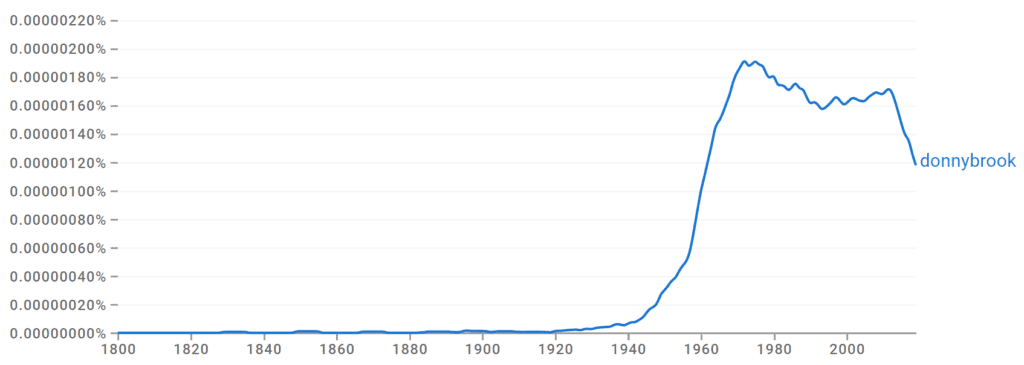Many words in the English language are influenced by foreign words, events, or even names. Donnybrook is one such word, meaning an uproar or disorder, and comes from a fair of the same name, the Donnybrook Fair held outside Dublin, Ireland.
The long history behind the association of the word with the fair has its origins in the European Carnival season which influenced carnivalesque fairs and gatherings throughout the rest of the continent. Let’s take a closer look at how a fair’s reputation influenced a word that has made its way into everyday language to mean a riotous argument.
What Is the Meaning of Donnybrook?
A donnybrook is an occasion that is a bit of an uproar, a chaotic brawl, or a heated disagreement. It is a noun created from an association with the Donnybrook Fair, which had become quite wild by the 1800s. Public displays of drunkenness, licentious behaviors, and fights were not uncommon.
At that time, a simile like Donnybrook Fair entered the English language to mean a wild, uproarious brawl. Eventually, the term was shortened to simply donnybrook. Note that the word has become so disengaged from its roots that it is no longer capitalized.
For example:
- In the script, the kiss the antagonist plants on a young woman’s lips sets off a donnybrook that spills into the streets, where we are introduced to the story’s main protagonist.
- The high school debate team entered into a highly spirited argument with the opposing team the evening before the match, leading to an old-fashioned donnybrook with each team captain taking swings at one another.
- Instead of highlighting the candidate’s tax reform platform, the media focused on his opponent’s latest donnybrook.
Today, Donnybrook is an affluent suburb of Dublin and is no longer associated with its wilder history.
What Is the Origin of Donnybrook?
The word donnybrook is a bit of an old-fashioned word but is still occasionally used, especially in North America, New Zealand, and Australia.
The Donnybrook Fair had been held since the 13th century and was likely influenced by the Lenten Carnivals of Southern Europe. Fairs and carnival-like gatherings were common at the time and often were held around different religious feast days at various times of the year. It was first held in May during the Feast of the Invention of the Cross but was later moved to August.
It’s probable that the area may have already had a yearly fair at that time due to its border location, which also was along a river. Areas like this were easily accessed and also popular to travel to trade and barter.
Through the centuries, the fair grew to include entertainment, and people traveled from all over to visit and forget their daily tasks for as long as their money was held out. The fair lasted for two weeks, and by the late 17th century, attempts to curtail the poor behaviors that plagued the fairgoers were already occurring.
The biggest issue surrounding the fair until the 1850s was the owning family, who opposed any fair suppression due to their hefty profit margins. But when the family patriarch died in 1850, and his widow sold the fair in 1855, some amount of control was gained. In 1866 the fair came to an end once and for all.
Let’s Review
A donnybrook is an old-fashioned word that serves as an associative simile to describe behaviors akin to an uproarious brawl or heated argument. Its unique background encompasses a fair that was held for over 600 years before finally coming to an end after a century’s worth of poor behavior.


